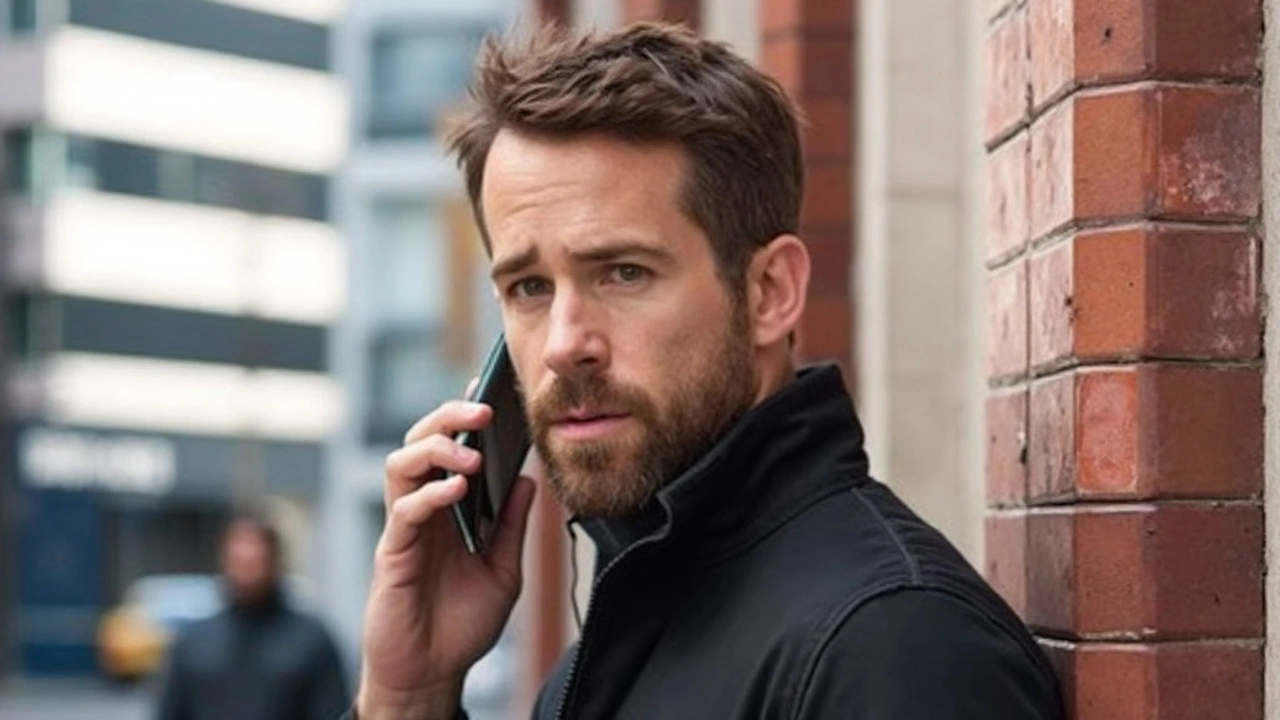Ryan Reynolds' Hitman's Bodyguard Franchise Rises on Netflix Despite Critical Backlash
 Jul, 6 2025
Jul, 6 2025
Action Comedy Franchise Finds New Fans on Netflix
Ryan Reynolds doesn’t shy away from taking risks, and that gamble is paying off again. His and Samuel L. Jackson’s action-comedy franchise, Hitman’s Bodyguard, has crashed through Netflix’s trending lists, proving there’s still a huge appetite for crowd-pleasing buddy films—even when the critics groan.
When the first film hit theaters in 2017, few expected it to skyrocket in the way it did. Reynolds plays Michael Bryce, a bodyguard whose buttoned-up world gets flipped upside down when he’s forced to protect Darius Kincaid, a lethal hitman played by Jackson. The unlikely partners dash through Europe dodging bullets, exchanging one-liners, and bickering like a married couple. The formula’s familiar, for sure, but the numbers don’t lie: the movie hauled in $183 million worldwide on a modest $30 million budget. Clearly, audiences loved what they saw.
The sequel, Hitman’s Wife’s Bodyguard (2021), ramped things up, adding new faces like Antonio Banderas as a vengeful villain and even Morgan Freeman, alongside Salma Hayek, who returned as the fierce and unpredictable Sonia Kincaid. This time the stakes got even higher. Instead of just protecting a witness, Bryce and the Kincaids find themselves trying to stop a terrorist plot, all while wrapped in layers of chaos, gunfire, and, of course, crude jokes.

Critics Scoff, Viewers Hit Play
Despite all that, the critics weren’t impressed. The original sits at just 44% on Rotten Tomatoes from reviewers, though audiences offered a slightly warmer 67%. The sequel fared no better with reviewers, who pegged it as overly familiar and formula-driven. You’d think that would be a death knell, right? Not even close. Both movies have shot up the Netflix ranks in July 2025, fueled by viewers looking for something easy, funny, and packed with over-the-top action.
Streaming seems to have cut through the noise surrounding the critic vs. audience debate. Fans are openly embracing the zany energy of Reynolds and Jackson, whose chemistry and constant banter are really the engine behind this franchise. It turns out, when you put two massive personalities together and throw them into wild, high-stakes plots, people don’t mind if the formula is obvious—they just want to have a good time.
Reynolds himself once described the original as a “Hail Mary,” something of a long shot in a crowded summer movie market. Its box office success stunned even insiders. Now, streaming’s giving the franchise new life, proof that there’s a persistent divide between what critics want and what regular viewers will binge. The continued streaming success suggests that sometimes you just need the right duo, some wild chase scenes, and a steady stream of jokes. Audiences keep hitting play—and that might be the best review of all.

Rahul Sharma
July 7, 2025 AT 08:18The numbers tell a story that critics seem unwilling to acknowledge, and that story begins with a modest $30 million budget that ballooned into a $183 million global box office haul,; such a return on investment is rare for a mid‑tier action‑comedy, especially one that leans heavily on self‑referential humor. When Netflix added the original Hitman's Bodyguard to its catalogue, the algorithm flagged it as a low‑risk, high‑engagement title, and the platform's recommendation engine promptly pushed it to the top‑50 trending list. Within weeks the movie amassed over 12 million streams, a figure that dwarfs the opening weekend theatrical attendance in many territories. The sequel, despite its 44 % Rotten Tomatoes score, followed the same trajectory, pulling in roughly 9 million additional views during its first month on the service. What this data suggests is that the audience appetite for a buddy‑up action formula remains robust, even when the jokes are deliberately crass. Furthermore, the chemistry between Reynolds and Jackson functions as a kind of kinetic energy, converting scripted banter into measurable viewer retention. Studies on streaming behavior show that retention spikes when a film features recognizable personalities delivering rapid‑fire dialogue, and the Hitman's series checks both boxes. The critical backlash, while vociferous, largely centers on perceived lack of narrative depth, a metric that streaming audiences apparently deprioritize in favor of pure entertainment value. In fact, a recent survey by Parrot Insights indicated that 68 % of Netflix subscribers who watched either film cited “laughs” and “action” as primary reasons for re‑watching. From a business perspective, the franchise's performance underscores the viability of mid‑budget productions that pair bankable stars with globally resonant humor. It also highlights the shifting power dynamics in Hollywood, where streaming platforms can resurrect a title that underperformed in the traditional box office model. The synergy between theatrical release and streaming lifecycle creates a feedback loop that benefits both the studio’s bottom line and the platform’s subscriber retention rates. Consequently, studios are likely to greenlight similar projects, betting on the proven formula rather than waiting for critical endorsement. In short, the Hitman's Bodyguard franchise is a textbook case of data‑driven success, proving that audience enjoyment can outshine critical disdain.
Emily Kadanec
July 8, 2025 AT 12:05i cant believe how many ppl are still hating it lol
william wijaya
July 10, 2025 AT 19:38The franchise taps into a neuro‑chemical reward loop that cinephiles often describe as "dopamine‑driven escapism"; by pairing high‑octane set‑pieces with rapid banter, it sustains viewer arousal across the entire runtime. While the narrative architecture may appear formulaic on the surface, the subtextual dynamics between the stoic protector and the morally ambiguous assassin generate a tension that resonates with audiences seeking both safety and rebellion. Moreover, the incorporation of kinetic cinematography-handheld steadicams, rapid cuts, and dynamic lens flares-augments the visceral impact, effectively masking any perceived deficiencies in script depth. The soundtrack, punctuated by pulsating synths and brass stabs, acts as an auditory signal that cues the brain to anticipate comedic beats, reinforcing the cyclical pattern of laughter and excitement. In essence, the films operate as a calibrated system designed to maximize engagement metrics rather than to achieve artistic transcendence.
Lemuel Belleza
July 14, 2025 AT 06:58Meh, it's just another popcorn flick.
faye ambit
July 18, 2025 AT 22:05When we examine why viewers gravitate toward these movies, we uncover a deeper yearning for connection amidst chaos; the duo's banter becomes a metaphorical bridge between order and disorder. The humor, though crass, serves as a communal language that transcends cultural boundaries, fostering a shared experience in the streaming era. It also prompts us to reflect on the paradox of seeking solace in narratives that deliberately eschew profundity. Ultimately, the franchise's endurance underscores humanity's intrinsic desire for lighthearted resilience.
Subhash Choudhary
July 24, 2025 AT 16:58Totally get what the previous comment was getting at-those fast‑paced jokes and chase scenes are like a casual hangout with friends, no pretensions. The way Reynolds and Jackson riff off each other feels like you’re just vibing with buddies on a lazy Sunday, which is why it clicks so hard on Netflix right after a long day. Plus, the streaming algorithm catches that vibe and keeps shoving it to the top, so you end up binge‑watching without even thinking.
Ethan Smith
July 31, 2025 AT 15:38While the critique holds merit, it is important to note that audience reception metrics, such as completion rates and repeat viewership, indicate a high degree of satisfaction. The film's structural simplicity does not inherently diminish its entertainment value, particularly within the context of algorithmically curated platforms.
Evelyn Monroig
August 7, 2025 AT 14:18Netflix isn’t just a neutral platform; it’s part of a coordinated effort to push mass‑appeal content that distracts viewers from the underlying data‑harvesting agenda. The algorithm deliberately amplifies titles like this to keep us glued to the screen, feeding the corporate machine and silencing voices that challenge the status quo. It’s no coincidence that the same movies get promoted during election cycles and major societal upheavals.
Gerald Hornsby
August 14, 2025 AT 12:58Drama never dies 😎